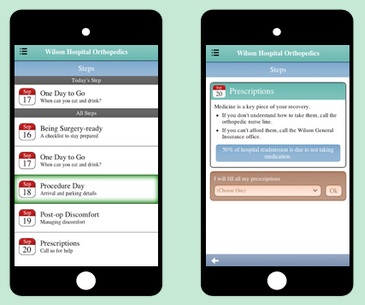 Infield Health's Healthy Steps app.
Infield Health's Healthy Steps app.
People in a Weight Watchers program who received motivational and reminder text messages lost an average of 4.5 pounds more in a 12-week period than those who were left to their own volition, a newly published study found. Text messaging also showed promise for increasing exercise and promoting other healthy behaviors, according to researchers from Virginia Commonwealth University Medical Center, Richmond, Va.
The article, newly published in the scientific journal CIN: Computers, Informatics, Nursing, describes what researchers said is the first study to look solely at text messaging as a means of enhancing clinician-patient communication for the purpose of behavior change. "Nothing before isolated SMS by itself," said lead author Claudia Bouhaidar, a researcher at the VCU School of Nursing.
In addition to the weight loss, which corresponded to about 3 percent of body weight, Bouhaidar and her team found a "trend toward an improvement in eating behaviors, exercise and nutrition self-efficacy in the intervention group," though no significantly significant differences from a control group. However, nearly 80 percent of the 28 participants said that text messages helped them in their struggle to adopt healthy habits.
"The message by itself helped as a reminder to [eat well and exercise more]," Bouhaidar said.
Using technology from Infield Health, a Washington, D.C.-based vendor of secure texting services to help healthcare providers educate patients before medical procedures and follow up afterwards, the VCU researchers sent reminder messages to study participants, who were recruited from "Weight Watchers at work" weight management programs in the Richmond area.
Queries included: "Keep in the fridge a Ziploc with washed and precut vegetables 4 quick snack. Add 1 string cheese 4 proteins. Did u try it this week? Reply yes or no," according to the article. The journal article said participants received "biweekly" texts, though Bouhaidar told MobiHealthNews that the interventions actually took place twice a week, not every other week.
At the start of the 12-week study period, participants responded about 66 percent of the time. That fell to 52 percent by the end of the study. That was acceptable to the researchers, who also found that 72 percent of participants considered texting "somewhat" to "very motivational," according to the article. However, some complained about the timing of the messages, catching them in the middle of the workday or while driving.
"The ubiquitous spread of mobile phone short message systems (SMS) appears to offer an effective alternative to face-to-face approach when delivering behavioral weight management interventions," the VCU team wrote.
Bouhaidar said she and her colleagues did not follow up with the participants to see if behavior changes and weight loss held beyond the 12-week study, but expressed a desire to study text messaging on a wider scale. "This was just to test the feasibility," Bouhaidar said.
"I think it's a good way to reach large populations," Bouhaidar added. "It's really easy and cost-beneficial."














